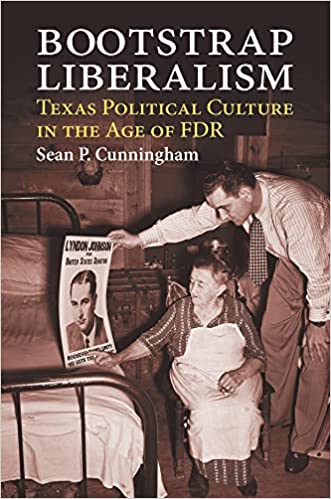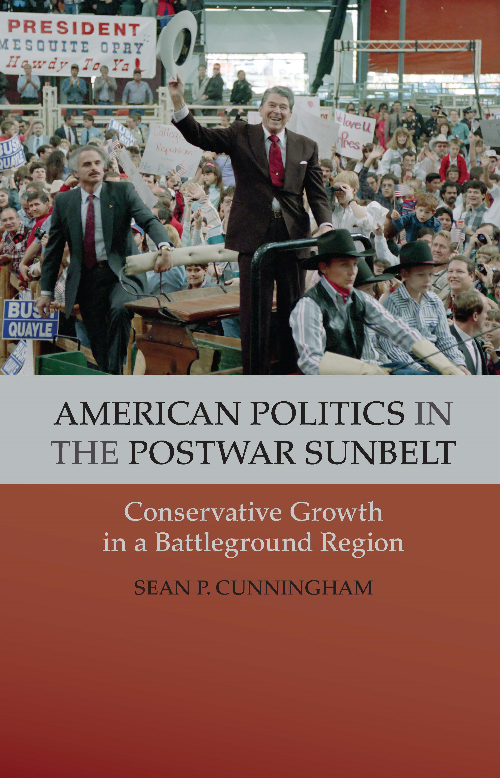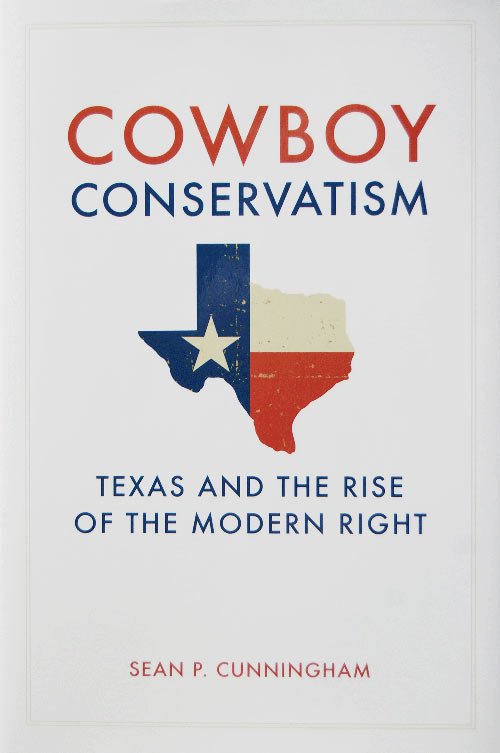Sean P. Cunningham
Email: Sean.Cunningham@ttu.edu
Office: 109C Humanities
Ph.D., University of Florida
Sean P. Cunningham is Professor of History and Associate Dean for Administrative Affairs
for the College of Arts & Sciences. From 2014 to 2023, he served as Chair of the Department
of History. He teaches broadly in twentieth-century U.S. history, while specializing
in the history of modern American political culture. His geographic emphasis is on
the Sunbelt, Texas in particular.
Cunningham has authored three books: Bootstrap Liberalism: Texas Political Culture in the Age of FDR (University Press of Kansas, 2022), which won the Texas Tech University President’s
Book Award (first place) in 2024; American Politics in the Postwar Sunbelt: Conservative Growth in a Battleground Region (Cambridge University Press, 2014); and Cowboy Conservatism: Texas and the Rise of the Modern Right (University Press of Kentucky, 2010), which also won the Texas Tech University President's
Book Award (first place) in 2012.
As a university administrator, Cunningham serves on TTU’s Strategic Enrollment Management
Council and its Strategic Planning Committee, is Chair of the University Athletics
Council, and is also Chair of the Editorial Board for Texas Tech University Press.
In 2022-23, he assisted with the curation of the Texas Tech Museum's Centennial Celebration
exhibit on the history of Texas Tech athletics, and co-edited the university's official
centennial celebration book, 100 Years, 100 Voices. Additionally, Cunningham has served as a "Chair Mentor" for the university's National
Science Foundation (NSF) ADVANCE Grant, was a member of the Provost’s Faculty Success
Task Force and Advisory Committee (2017-22), is Title IX Liaison for Academic Affairs,
and, from 2018 to 2021, helped coordinate a program known as "Civil Counterpoints"
- a campus conversation series designed to model and stimulate thoughtful, professional,
and respectful dialogue on volatile issues of contemporary interest.
In addition to his responsibilities as a university faculty member and administrator,
Cunningham serves on the Board of Directors for Humanities Texas – the state's affiliate
to the National Endowment for the Humanities (NEH) – as well as the Historical Advisory
Board at TX4T, a non-profit organization that provides social studies teachers and
students in K-12 schools with access to evidence-based historical content and best-practices
pedagogy resources related to the teaching of Texas history. He is also a member of
the Alliance for Texas History.
Finally, Cunningham is also a decorated teacher. A three-time winner of the Mortar
Board "Apple Polishing Award"(2008, 2023, 2024), he received the university's "Integrated
Scholar Award" in 2021, in recognition of "faculty who dedicate themselves to a course
of lifelong learning and advance Texas Tech's role in educating, serving, and inspiring
others to do the same." In 2020, he was elected to membership in the university's
prestigious Teaching Academy. Additionally, Cunningham has won the President's Excellence
in Teaching Award (2013), the Professing Excellence Award, presented by University
Student Housing (2012), the Department of History's Distinguished Faculty Award (2010
and 2008), and was named the College of Arts & Sciences winner of the Texas Tech Alumni
Association's New Faculty Award (2010). Finally, before joining Texas Tech's faculty
in 2007, Cunningham was awarded the Calvin A. VanderWerf Award in recognition of his
selection as the outstanding Graduate Teaching Assistant at the University of Florida,
where he earned his Ph.D.
Prior to his graduate work in Gainesville, Cunningham completed his B.A. in Public
Relations from Texas Tech University in 1999, before earning his M.A. in History and
his M.Ed. in Higher Education, also at Texas Tech, in 2002.

Select Publications
Bootstrap Liberalism: Texas Political Culture in the Age of FDR
 Has Texas always been one of the United States’ most conservative states? The answer
might surprise you. Bootstrap Liberalism offers a glimpse into the world of Depression-era Texas politics, revealing a partisan
culture that was often far more ideologically nuanced and complex than meets the eye.
Has Texas always been one of the United States’ most conservative states? The answer
might surprise you. Bootstrap Liberalism offers a glimpse into the world of Depression-era Texas politics, revealing a partisan
culture that was often far more ideologically nuanced and complex than meets the eye.
The Lone Star State is often viewed as a bastion of conservative politics and rugged
“bootstrap” individualism, but that narrative overlooks the fact that FDR's New Deal
was quite popular in Texas, much more so than previous histories of the era have suggested.
While it is true that many Texas Democrats remained staunchly conservative during
Franklin D. Roosevelt’s presidency, and it is also true that many of these conservatives
formed the basis of an established majority that would grow stronger in the decades
that followed, it is simultaneously true that ordinary voters—and a good many politicians—embraced
New Deal policies, federal experimentation, and direct economic aid, and often did
so enthusiastically as liberal Texas Democrats rode FDR’s coattails to electoral success.
Texas political leaders recognized the popularity of the New Deal and identified themselves
with FDR for their own political advantage. Using original resources mined from six
research archives, Bootstrap Liberalism explores campaign strategies and policy debates as they unfolded at the local, state,
and national levels throughout the Great Depression and World War II eras, revealing
a consistent brand of pro-New Deal messaging that won favor with voters across the
state. Most Texas Democrats did not apologize for supporting FDR. Rather, they celebrated
him and often marketed themselves as New Deal Democrats. Voters endorsed that strategy
by electing liberals throughout the 1930s and early 1940s.
American Politics in the Postwar Sunbelt: Conservative Growth in a Battleground Region
 This book analyzes the political culture of the American Sunbelt since the end of
World War II. It highlights and explains the Sunbelt's emergence during the second
half of the twentieth century as the undisputed geographic epicenter for conservative
Republican power in the United States.
This book analyzes the political culture of the American Sunbelt since the end of
World War II. It highlights and explains the Sunbelt's emergence during the second
half of the twentieth century as the undisputed geographic epicenter for conservative
Republican power in the United States.
The book also investigates the ongoing nature of political contestation within the
postwar Sunbelt, highlighting the underappreciated persistence of liberal and progressive
influences across the region. Cunningham argues that the conservative Republican ascendancy
that so many have identified as almost synonymous with the rise of the postwar American
Sunbelt was hardly an easy, unobstructed victory march. Rather, it was consistently
challenged and never foreordained. The history of American politics in the postwar
Sunbelt resembles a rollercoaster of partisan and ideological adaptation and transformation.
Cowboy Conservatism: Texas and the Rise of the Modern Right
 This book explores the major moments, issues, personalities, and creative forces that
coalesced during the 1960s and 1970s to reshape the political landscape and culture
of Texas, thereby transforming the Lone Star State into the nation's most powerful
Republican stronghold.
This book explores the major moments, issues, personalities, and creative forces that
coalesced during the 1960s and 1970s to reshape the political landscape and culture
of Texas, thereby transforming the Lone Star State into the nation's most powerful
Republican stronghold.
Utilizing extensive research drawn from the archives of four presidential libraries,
gubernatorial papers, local campaign offices, and oral histories, Cunningham reveals
a vivid portrait of modern conservatism in one of the nation's largest and most politically
powerful states.
Department of History
-
Address
Texas Tech University, Box 41013, 3001 15th Street, Humanities (formerly English/Philosophy) 165, Lubbock, TX 79409 -
Phone
806.742.3744 | Fax: 806.742.1060 -
Email
info.history@ttu.edu
